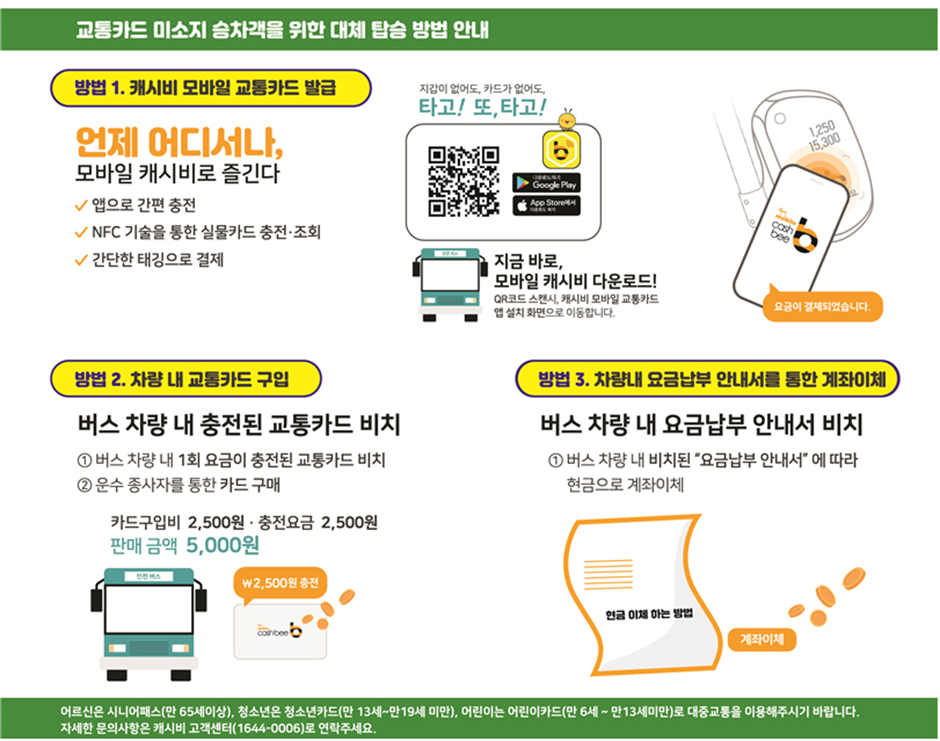- Only 0.03% of passengers board buses without a transportation card, 50% of all semi-public bus routes across Incheon to transition to a cashless system -
- City also plans on adding other emergency payment options
(e.g. direct account transfer) to passengers with no limited access to transportation card options -
Incheon Metropolitan City (Mayor: Yoo Jeong-bok) announced its latest plan to expand its “cashless” bus network across the City. Starting on July 1, the number of cashless buses in Incheon will go from 247 last year to 951.
More specifically, the City will expand its cashless bus network to 951 buses at 34 bus operators servicing 111 routes. Incheon’s cashless bus network has seen some great success throughout its pilot phase since January 2022, which gave City officials a chance to promote the new initiative and monitor it to weed out potential issues. This means 50% of Incheon’s semi-public bus routes will now become completely cashless.

According to the City, the number of passengers paying for fares in cash dropped from 2.2% in 2021 to just 1.68% in 2022. Meanwhile, keeping cash registers on board buses costs KRW 360 million per year. Moreover, cash registers installed in buses back in 2009 are nearing the point where they need to be replaced, and replacing all cash registers in operation could cost up to KRW 8.56 billion.
To seek a more forward-looking solution to the problem, Incheon launched a new pilot initiative to switch a few buses to a cashless system and monitored its progress. Results showed that only 0.03% of all passengers boarding these cashless buses did not hold a transportation card.
The City expects cashless buses to save a total of KRW 8.9 billion in cash register replacement costs and other maintenance expenses once it expands its cashless bus initiative to more buses servicing the Incheon area.
Moreover, a new cashless network is expected to prevent the risk of accidents and delays caused by drivers having to hand out coins or bills to cash-paying passengers while on the move, and also alleviate the added pressure on drivers to carry, count, and protect cash registers.
Passengers without transportation cards can either follow the instructions on alternative payment options and pay their fares via direct wire transfer, buy a mobile transportation card they can access and top-up using a dedicated mobile app, which was something they could do during the pilot phase of the cashless bus initiative, or buy a transportation card available inside the bus.
Incheon plans to distribute promotional materials on how its cashless bus network is about to expand and instructions on how passengers can pay for bus fares if they do not have a transportation card. These materials will be available at bus stations, inside buses, and via audio-visual announcements using the PA system in buses and LED signboards installed outside buses. For teenagers and children who often pay cash for bus rides, the City plans to distribute promotional materials to schools across Incheon and teach children how to use cashless buses in advance.
On June 15, Incheon hosted a briefing session detailing its plan to expand the City’s cashless bus network, and also invited drivers and other transportation workers to share information about the cashless system and offer useful tips for better, friendlier service.
Jo Yeong-gi, Director of the City's Bus Policy Department, said, “Turning our buses cashless can create a safe bus environment by reducing the cost it takes to keep a cash register, and also by preventing accidents and delays caused by drivers handing out loose change. Of course, passengers can take advantage of various discounts and transfer benefits they might be entitled to as well.” He added, “We will closely analyze problems we noticed during the pilot phase, and do our best to minimize any inconvenience going forward by promoting and preparing for the transition.”